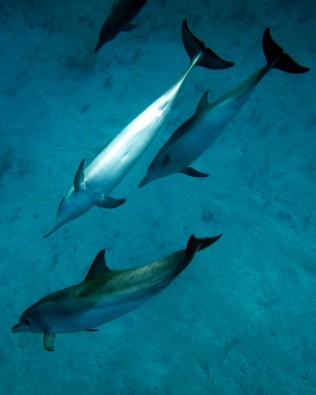
A biodiversity hotspot with one of the longest coral reefs in the world, the Caribbean archipelago of 30 islands, eight of which are inhabited, has long considered itself a safe haven for dolphins by forbidding the holding of captive marine mammals. A governor’s unilateral decision to change the legislation in October 2012 effectively allowed the opening on Provinciales of a “Swim with the dolphin” program by Dolphin Cove (TCI) Ltd, a company which runs similar programs at no benefit to the dolphins on Jamaica. Besides the psychological damage and deaths caused by unnatural behaviour to support captive dolphin businesses, the ex-Director of the Department for Environment and Marine Affairs, Kathleen Wood, has come out strongly against the dolphinarium and maintains the move will also be detrimental to the economy, in that the income gleaned, mainly from passing cruise ships and rich tourists, will go to the Jamaica-owned company rather than the islanders doing the work.
A British overseas territory, the islands southeast of the Bahamas are represented by a governor appointed by Queen Elizabeth II on the advice of the Foreign Office. The UK and TCI hold joint responsibility for its conservation and preservation in terms of international environmental conventions, but official corruption and tourism have led to escalated development in contravention of these conventions.
In January 2013, four not-for-profit organizations, the Provo Chamber of Commerce, Pride Ltd, the TSPCA and the TC Reef Fund, joined forces to pursue legal action by way of a judicial review against Governor Ric Todd’s decision, on the strength of the 2011 Constitution, which states that any decision made by a law-maker must be “legal, rational, proportionate and procedurally fair.”
However, following the gazetting of the company in October 2014, which invited concerned parties to make representation against its application for a marine-themed facility, Judge Margaret Ramsey-Hale found that the representation by the group of four was not well-founded as it was based on a “misconception relating to the Fisheries Protection Ordnance”.
According to Ramsey-Hale, the Fisheries Protection (Amendment) Regulations of October 2012, “permit the importation and keeping of marine mammals for the purposes of display, exhibition or performance for companies that have completed the application processes and gained all the required permissions to develop and operate their facilities”. She contended that the application was unreasonable because the change to the regulations did not mention any particular species.
To date, a petition written by the SPCA to protest the decision has attracted thousands of signatures from concerned citizens and activists worldwide who hold out hope that the imminent closure of Sea World will add impetus to the global move to halt captive marine mammal programs.
In support, Cathy Williamson, of the globally accredited Whale and Dolphin Conservation Society added her voice to the protest: “We respectfully ask the government of the Turks and Caicos Islands not to risk the responsibility a dolphinarium brings with it in terms of welfare and conservation. We call on you to do all you can for the conservation of dolphins in their natural environment and prevent this project from going ahead.”
Read Ethical Traveler's Reprint Policy.
